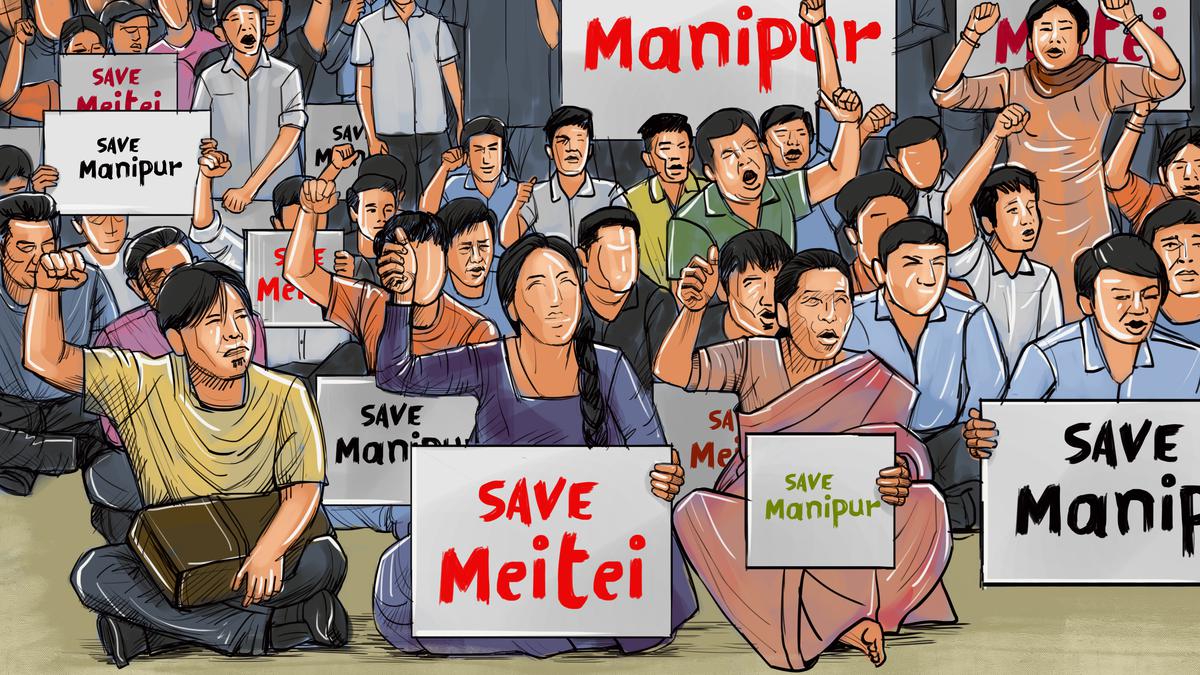V
Vedant Pathak
Guest
The Kukis have re-emerged in recent times. This resurgence concerns the desecration of Mount Thangjing, a revered pilgrimage site for Hindus.

Cross and flag of ZRA found erected on Mt Thangjing Meitei’s sacred site desecrated – The Sangai Express
Mount Thangjing, believed to be the divine abode of Mahadev and Ibudhou Thangjing, has been desecrated for the third time since the infamous violence was triggered. This near 2000-year-old holy site is being “re-christened” as Mount Olive, and a pastor could be observed conducting rituals. Furthermore, 393 temples and sacred shrines have been destroyed, many of them reduced to dust in Kuki-dominated Churachandpur.
This question arises: How do authorities permit this? The political landscape of the region provides the answer. The Congress party faces accusations of enabling missionaries to conduct operations in these states. This authorization encompasses not only the presence of missionaries but also their activities. It involves conversions and the establishment of institutions.
The Congress party has not merely overlooked these activities but have actively facilitated them. This has resulted in assertions that missionaries have completely taken control of the region. They have exerted influence over its cultural, social, and religious fabric.
Bharat Singh, the BJP MP from Ballia, has raised concerns about the weakening of democracy in the North-Eastern states. He attributes this to the conversion of locals into Christianity. Furthermore, he accuses the Congress party of facilitating these conversions, alleging that they are operating under the directives of Christian missionaries. This has sparked a heated debate about religious freedom and political influence in the region.
People perceive the desecration of Mount Thangjing, a sacred site for the Meitei community, as a clear provocation. The Meitei community reveres this mountain as the divine abode of Mahadev and Ibudhou Thangjing, attributing immense religious significance to it. They view the desecration as someone directly attacking their religious sentiments.

PC The Hindu
The Meitei Heritage Society, a dedicated organization preserving the cultural and religious heritage of the Meiteis, has protested this act. They draw an analogy between the desecration and converting revered temples like Amarnath or Badrinath into cemeteries, emphasizing the gravity of the situation. They accuse the Kuki community of baiting the Meitei people by hurting their religious sentiments. This act of desecration has not only caused emotional distress but has also heightened tensions between the two communities. It emphasizes the need for mutual respect and understanding in maintaining the religious harmony of the region.
The re-emergence of the Kukis and the role of the Congress in allowing missionary activities in the North-Eastern states have led to a complex and volatile situation. Sacred sites’ desecration has ignited tensions, prompting a deeper examination of the political and religious dynamics at play in the region. All parties involved must engage in dialogue and work towards peaceful coexistence, respecting the cultural and religious diversity of the region.
The post The Re-emergence of Kukis and the Role of Congress in North-Eastern India appeared first on The Jaipur Dialogues.
Continue reading...
A Trigger for Controversy

Cross and flag of ZRA found erected on Mt Thangjing Meitei’s sacred site desecrated – The Sangai Express
Mount Thangjing, believed to be the divine abode of Mahadev and Ibudhou Thangjing, has been desecrated for the third time since the infamous violence was triggered. This near 2000-year-old holy site is being “re-christened” as Mount Olive, and a pastor could be observed conducting rituals. Furthermore, 393 temples and sacred shrines have been destroyed, many of them reduced to dust in Kuki-dominated Churachandpur.
Congress and Missionary Activities in North-Eastern India
This question arises: How do authorities permit this? The political landscape of the region provides the answer. The Congress party faces accusations of enabling missionaries to conduct operations in these states. This authorization encompasses not only the presence of missionaries but also their activities. It involves conversions and the establishment of institutions.
The Congress party has not merely overlooked these activities but have actively facilitated them. This has resulted in assertions that missionaries have completely taken control of the region. They have exerted influence over its cultural, social, and religious fabric.
BJP’s Perspective
Bharat Singh, the BJP MP from Ballia, has raised concerns about the weakening of democracy in the North-Eastern states. He attributes this to the conversion of locals into Christianity. Furthermore, he accuses the Congress party of facilitating these conversions, alleging that they are operating under the directives of Christian missionaries. This has sparked a heated debate about religious freedom and political influence in the region.
Meitei Community’s Response
People perceive the desecration of Mount Thangjing, a sacred site for the Meitei community, as a clear provocation. The Meitei community reveres this mountain as the divine abode of Mahadev and Ibudhou Thangjing, attributing immense religious significance to it. They view the desecration as someone directly attacking their religious sentiments.

PC The Hindu
The Meitei Heritage Society, a dedicated organization preserving the cultural and religious heritage of the Meiteis, has protested this act. They draw an analogy between the desecration and converting revered temples like Amarnath or Badrinath into cemeteries, emphasizing the gravity of the situation. They accuse the Kuki community of baiting the Meitei people by hurting their religious sentiments. This act of desecration has not only caused emotional distress but has also heightened tensions between the two communities. It emphasizes the need for mutual respect and understanding in maintaining the religious harmony of the region.
The re-emergence of the Kukis and the role of the Congress in allowing missionary activities in the North-Eastern states have led to a complex and volatile situation. Sacred sites’ desecration has ignited tensions, prompting a deeper examination of the political and religious dynamics at play in the region. All parties involved must engage in dialogue and work towards peaceful coexistence, respecting the cultural and religious diversity of the region.
The post The Re-emergence of Kukis and the Role of Congress in North-Eastern India appeared first on The Jaipur Dialogues.
Continue reading...
